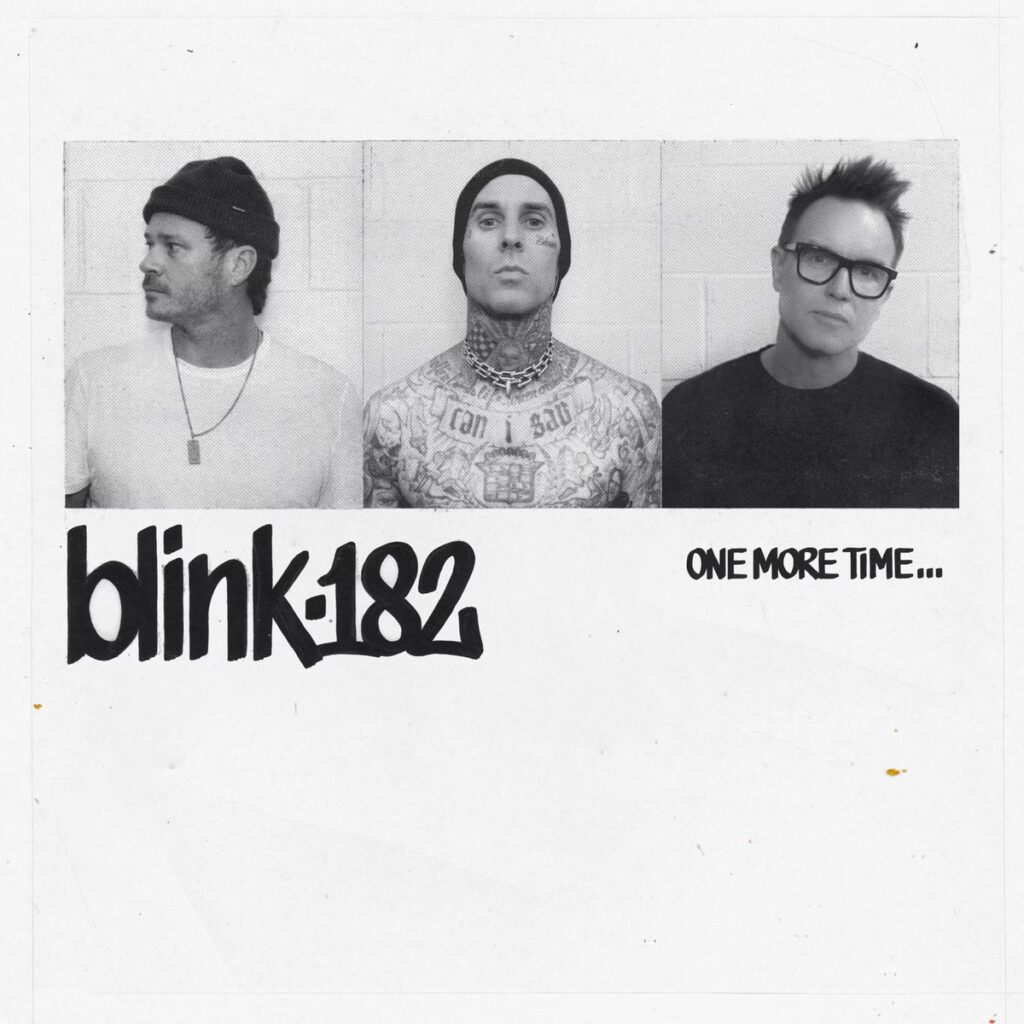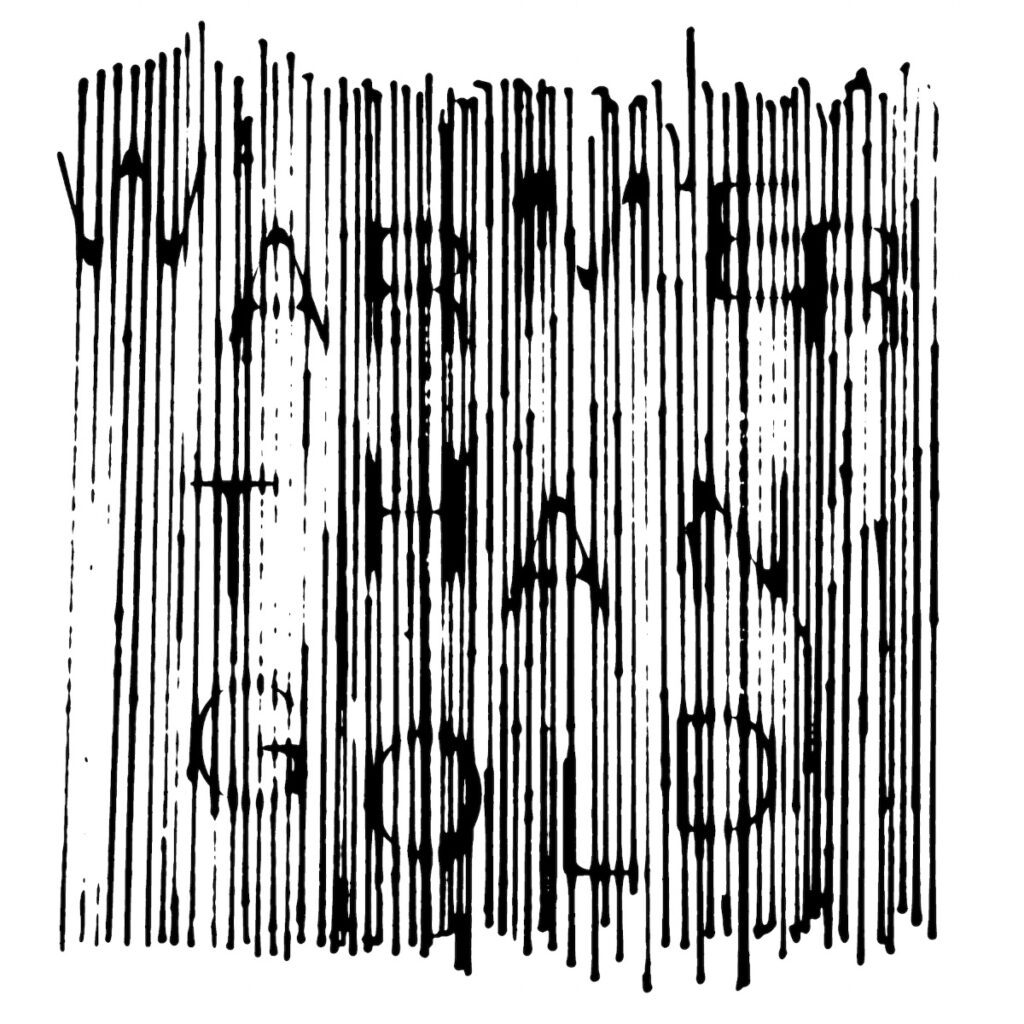
Pop-punk is the new classic rock. I guess this is growing up.
One More Time… – the new album by scene elders Blink-182 – arrives at a moment when stock in the genre is at an all-time high, rising from an underdog insurgence on the alternative rock (and pop) charts into a steady dividend-earning period of blue chip imperialism. Look at the behemoth arena tours of the band’s younger siblings in Paramore and My Chemical Romance, the corporate-cash cow of Live Nation’s Blink-headlined When We Were Young festival (taking place over this weekend), and the way our newest pop stars are wearing turn-of-the-century punk signifiers like retro fashion statements. Older millennials are either passing their childhood taste to their own kids, or those kids are simply tracing their way back to their current icons’ influences – from Willow to Avril Lavigne, Lil Uzi Vert to Hayley Williams, and Machine Gun Kelly to Travis Barker (something of a sage for aspiring mall punks in the last several years).
This entrenched permeation of early aughts rock has turned the once-yearning spirit of pop-punk (and its adjacent offshoots) into something universally recognizable but less individually inspiring. We are saturated by nostalgic facsimiles of our past, such that the authors of the originals can barely break through the noise anymore. Bands approaching legacy status must lean on what they’ve already left behind, recapturing a market they once owned largely through represses and anniversary tours. It’s the passage of time’s crystallization of the canon. The fear for any aging commercial outfit is that their past work will not only outlive them, but outrun them.
It is into this cultural domination of the music they originally helped bring to the masses that Blink return with their ninth studio album, the first recorded with the classic trio of Mark Hoppus, Tom Delonge, and Travis Barker in 12 years. More so than with any of their peers, interest in the Blink reunion has been particularly fervent, even stronger than it felt when they did the same song and dance in 2009. The band performed their live re-debut during back to back weekends of Coachella (where they helped to replace Frank Ocean as headliner for Weekend 2), followed by a massive tour running through the summer.
During their initial surprise appearance at Coachella’s first weekend, Blink’s routine sailor-mouthed stage banter and lewd gags caused a handful of my more tasteful friends to take off early. Despite cancer diagnoses, plane crashes, and validation from the US government, as well as the new sensibilities of the cultural mainstream they are reentering, this band had proudly refused to clean up their act. Was I a little embarrassed sticking around? Sure, but they ended the set with the one-two-three punch of “I Miss You” into “All The Small Things” into “Dammit”, which was the most fun 10 minutes of music all weekend.
Much like with classic rock, listeners of pop-punk love to relive the greatest hits of their glory days, and the Blink reunion certainly affords folks with the right amount of disposable income the opportunity to do so, now once again with the original whinny of Delonge, relieving Matt Skiba from his stint filling in. The Skiba era coincided with a push from Blink to reach the crossover territory enjoyed by the more shameless likes of Fall Out Boy or Panic! At The Disco. DeLonge’s return disrupts that movement and naturally begs a backtrack to earlier sounds. But what is the value of more music from the OG Blink in 2023? Who is clamoring for new tunes from these men approaching their 50s to sit beside their existing favorites?
As an excuse to add another few legs to their world tour, they could do far worse. There are some real gems that I would love to hear slotted next to their pre-hiatus material on a setlist, such as the frenetic chug of “Dance With Me.” Or take “Blink Wave”, which jitters with new wave textures and synths and has the band sounding their most like the Cure since they actually had Robert Smith on one of their songs. “When We Were Young” is a simple but effective rallying cry almost certainly designed as a bid to soundtrack the promo of the namesake festival.
As an argument for the alchemic properties of this lineup configuration, the band really sounds like they have something to prove. DeLonge’s guitar work is sprightly and tactile. Barker’s technical onslaught, which can sometimes feel like a party trick seeking a purpose, coheres into rich rhythmic tapestries on “Turpentine” and “You Don’t Know What You’ve Got”, the latter of which turns in a tumbling tin pattern that reminds me of the intro of “Always.” Hoppus, meanwhile, howls with a heavy heart that imbues some depth into relatively generic songwriting, not unlike what Dave Grohl achieved with this year’s refreshing But Here We Are.
But there are dull moments to be sure, enough that in aggregate those flashes of excitement quickly begin to fade from memory. At times the gloss is turned up too high, drawing attention to the industry machinery behind the curtain. Other times you can feel the songwriters compensating for clarity of thought with volume. They uninspiringly attempt movie credit profundity on closer “Childhood” and get their Raditude on with the hand-clappy and mealy-mixed “Fell In Love”.
Most of their attempts at humor also unfortunately not only fall flat, but on their face. Anytime you want to listen to “Dance With Me” you have to sit through a lame masturbation joke. Meanwhile early single “Edging” offers groanworthy punchlines like “She tried to pray it away, so I fucked her in church.” The interlude “Turn This Off!” strives for youthful provocation as DeLonge shouts, “If you’re offended by these words please fuck off!” but has the adverse impact of making him sound like a cancel-culture-befuddled boomer.
I was about ready to write off this enterprise entirely when the record’s title track dropped last month. The sentiment of the plainspoken ballad is powerful, lived in, and undoubtedly earned, following two out of three of the members’ near-death experiences. But why must that sentiment be attached to a song so uninspired, paint-by-numbers, and just overwhelmingly milquetoast? Treacly and heavy-handed, it suggested that Blink were letting the narrative drive their reunion instead of any innate musical curiosity still existing between the three. When I looked back at the band in 2016, I suggested they did not have “much left in them beyond harmless throwbacks to a sound from a period in time long since past.”
One More Time… has enough going for it that it proves that forecast wrong, but clearly the band’s legacy is on their mind. That title track throws in a couple cheeky “I miss you”s, and the single seems designed to play a similar radio role as that song did for its parent album. The tracklist begins with “Anthem Pt. III” — a compelling musical intro, but so invested in creating a clean conclusion to the time bomb set by the prior two installments that it fails to capture either’s realistically messy depiction of coming-of-age disaffection.
The lack of messiness is the album’s biggest failure, sweeping what must have been a challenging reconciliation between brothers into tediously tidy cliches. The conceit doesn’t go much deeper than the title of “You Don’t Know What You Got”; “Terrified” is the most YA songwriting of the band’s career since they could be reasonably called young adults. Given the realities this band has survived on its way to 2023, you would think they would have more stories to offer these songs. Enema Of The State yielded twice as much wisdom and wit and was written when the band members were half their current age.
The charge of Peter Pan Syndrome dogged Blink-182 for most of their career, pushing them to crave the credibility of maturity on their self-titled album and 2011’s Neighborhoods. That self-seriousness never wore well on the band, often giving the feeling of three kids stacked in a trenchcoat. One More Time… demonstrates the members’ genuine growth into elder statesmen, and comes across more settled than anything they’ve recorded since the first break up. It also can’t compete with the hunger and commitment from many of the vital bands Blink made their mark on in the interim. The trio know their age this time, but you almost wished they wouldn’t act like it.



